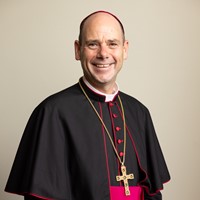‘Proclaim the Good News’ is, in church speak, what we call ‘evangelisation’. ‘Baptise in my name’ becomes the ‘Ministry of Christian Initiation’.
What follows is Bishop Michael’s recent letter to parishes and schools on the Ministry of Christian Initiation. It is made available here for everyone because the Ministry of Christian initiation is the concern of ALL the faithful. I invite you to read, reflect and engage in conversation with others.
7 November 2024
My dear Fathers, Deacons, Parish Leaders and all members of the faithful,
Having now completed eighteen months in the Diocese I have experienced a full cycle of the liturgical year and celebrated Mass with every parish and in almost every stational church.
You will have noticed the importance I place on well-celebrated liturgy. You have also heard me speak about the need for us to live as a missionary and evangelising community. The liturgy, in fact, is central to our life and mission. In this regard I wish to reflect with you on how we celebrate the Rite of Christian Initiation of Adults (RCIA).
This Rite, revised after the Second Vatican Council, can be a fruitful force at the heart of our parish life. When lived and celebrated properly it cannot be otherwise, as it holds in an essential unity the core ministries of the Church: Mission-Evangelisation and Initiation.
Well-appreciated and celebrated, the Rite of Christian Initiation of Adults has the potential to form our parishes to be missionary and evangelising communities. I know some of you are already making the link to my expressed desire for our diocese to be focused on mission and evangelisation. Without this missionary focus, the ministry of initiation flounders. And to properly evangelise those seeking initiation we need to include members of the faithful. The two ministries do indeed exist in an essential dynamic partnership.
Key principles for reflection
I have noticed a few areas that I hope we can focus on together to grow a parish and diocesan culture that is strong in both the ministries of evangelisation and initiation. It is my hope that together we can commit our energies to igniting a passion for these ministries amongst all the faithful. With this letter, therefore, let me plant just a few seeds by way of prompts and questions for reflection and conversation with the faithful.
- The ministries of evangelisation and initiation belong to all the faithful, not just the various parish teams involved in this ministry. How can we grow this understanding amongst the faithful? How can ordained ministers provide support while enabling what is essentially a ministry of all the faithful?
- Our door must always be open to seekers. We cannot simply tell seekers to come back later when our ‘initiation season’ begins. We must be ready to begin the journey of accompaniment whenever a seeker approaches us. How can we reimagine our parish life and mission to meet this need?
- We all need to re-immerse ourselves in the vision and procedures of the Rite of Christian Initiation of Adults. What might be a good first step in that direction for your parish community, particularly if the parish currently has nothing in place?
- The processes of ‘encounter’ and ‘accompaniment’ are central to the ministry of evangelisation and Christian Initiation. How do we shape our pastoral practice to embed these processes?
- Neophytes are a precious gift to any parish community and their first year of baptised life is critically important in continuing their formation and embedding them more deeply into the life and mission of the parish community. How could we grow this dimension of ministry, them to participate in the annual gathering with the bishop?
Practical issues for immediate attention
In addition to these significant prompts and questions, I wish to focus on some more practical dimensions of the RCIA that need immediate attention by parish leaders and Initiation teams:
- All those to be baptised at Easter – adults and children of a catechetical age – must participate in the Rite of Election at which I preside in the Cathedral. It is always celebrated on the First Sunday of Lent. There is a procedure for those who for exceptional circumstances are unable to be there. Instructions for this are available on the diocesan website. It is important to follow through on this promptly as the Period of Purification and Enlightenment must unfold over the six weeks of Lent. All this is explained in the RCIA (a 26-30).
- The Scrutinies and Presentations must be celebrated during the Lenten Season as outlined in the RCIA which explains beautifully how these rites are as much about the renewal and nourishment of all the faithful as they are for the Elect. (a 125)
- The focus of the Easter Vigil is baptism and full initiation. The baptism, confirmation and communion of adults, including children of catechetical age, ideally takes place at the Vigil.
- The reception of already baptised Candidates into the Full Communion of the Catholic Church can take place at any time of the year. If the readiness of these candidates aligns with Easter, this celebration is most appropriate for Easter Sunday or any of the other Sundays during the Easter Season.
The Elect and Neophytes
As indicated in the RCIA, it is customary for the bishop to gather with the neophytes at some point during their first year of baptised life. This year, supported by the Christian Initiation Forum, I gathered with six of our neophytes to reflect on their experience of initiation and engage in catechesis on the Eucharist. The afternoon culminated in the celebration of Mass at which the community joined me in blessing the neophytes.
Good and all as that was for those who participated, I was left wondering why only six opted to come. And while it is not about numbers, it is worth reflecting on the fact that nine catechumens registered for the Rite of Election this year. Not a significant number for a diocese of our size. I am aware too that across our parishes at least another ten were baptised at Easter without celebrating a Rite of Election. This means in total, the number of neophytes was close to 20.
Conclusion
I have continued to ponder all this for some months, and I have taken the time to write to you because I see our current reality as an opportunity and impetus to reflect together and reimagine how to nurture the ministry of Evangelisation and Initiation in our parishes in accord with the vision of the RCIA. I would like us to give some energy to this and I would like us to do it together, those in diocesan ministry supporting and accompanying parishes.
I encourage you to engage with the Diocesan Liturgy Council’s Christian Initiation Forum. I am aware of the ‘Come and See’ resources they have prepared to support and accompany any parish who feels ready to embark on such a journey of renewal. These resources are available on the diocesan website: https://www.mn.catholic.org.au/church-mission/catholic-life/liturgy/sacraments/. Click on the Reimagining the Ministry of Christian Initiation drop-down button.
I sense this is a moment, a ripe time in our life as a diocese, to focus on growing a parish and diocesan culture strong in both the ministries of Evangelisation and Initiation. We can’t afford to do nothing. Think for a moment what parish life will be like in five years if we keep on doing what we’ve always done with no change.
I am grateful for all that you and your teams do to welcome and initiate seekers into the Church and our parish communities. In 2025 I am looking forward to more catechumens at the Rite of Election and more Neophytes at my gathering with them on 22 June. I am also looking forward to meeting catechumens, candidates and neophytes when I visit parishes across the year.
Yours in Christ,
Most Reverend Michael Kennedy
Bishop of Maitland-Newcastle
Diocesan Liturgy Council Update
To keep abreast of the work of the Diocesan Liturgy Council click on the link and then the ‘Council News’ drop-down menu where you will find the latest meeting Report.
Acknowledgements
Image: © 2024 Diocese of Maitland-Newcastle. All rights reserved.
Follow mnnews.today on Facebook.


